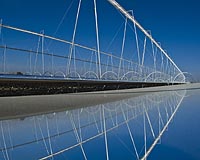 |
Berlin, Germany (SPX) Jul 13, 2010 Amendments to the photovoltaic feed-in tariffs of Germany's Renewable Energies Act (EEG) have been passed, marking a shift towards the rooftop segment. Germany's Bundesrat (lower house of parliament) approved the amendments this morning, clearing the way for them to become law. The changes abandon field installations on cropland and increase the attractiveness of the own consumption bonus for small and medium-scale rooftop installations. Implemented retroactively to take effect July 1, feed-in tariff rates will be reduced by 13 percent for rooftop installations and eliminated for cropland field installations. At the same time, conversion areas will see a reduction of 8 percent and all other areas will be decreased by 12 percent. Beginning October 1, these rates will again be reduced by a further 3 percent. Still, the new tariffs remain highly attractive, with rates anticipated to range from 25.02 - 34.05 EURc/kWh for installations connected between July 1 and October 1 and 24.26 - 33.03 EURc/kWh for those connected during the remainder of the year. The new amendments also more than double the federal target of annual installed capacity to 2.5 - 3.5 GWp. The law, which was established ten years ago, requires power companies to buy renewable energy from system owners at the corresponding feed-in tariff rate for 20 years, guaranteeing an attractive payback time and high returns. Even greater income can be secured by utilizing the "own consumption bonus," which is paid to rooftop installation owners of systems smaller than 500 kWp who intend to use the energy they generate. For 2009, photovoltaic installations amounted to 3.8 GWp, making Germany again the world's largest PV market and an attractive investment location for PV companies. Germany accounted for approximately one of every two newly installed modules worldwide. For 2010, some experts predict the market could double its 2009 mark.
Increased Demand by Private Users The shift in focus that favors the rooftop segment is expected to further increase demand for installations by private users who overwhelmingly prefer high-quality systems. Changes are also leading to growing demand for energy storage systems and smart grid applications to fully profit from the own consumption bonus. Decreasing system prices and rising electricity prices have enabled the German market to approach grid parity sooner than expected. By 2013 energy from renewable sources is expected to be competitive with conventional energy sources in the private user electricity market.
Quality Segment Boosts Attractiveness of Local Production Germany's PV industry also benefits from the highest density of R and D institutes in the industry. At the same time, the country boasts a well established industrial infrastructure, large equipment supplier base, and qualified and experienced workforce. An indicator of confidence in Germany's photovoltaic cluster strength, international companies First Solar and Avancis as well as German PV companies SolarWorld and Juwi have announced major expansions in Germany in recent weeks. All of these new investments are for sites in Eastern Germany, a major manufacturing hub for Germany's globally renowned photovoltaic industry.
Share This Article With Planet Earth
Related Links Germany Trade and Invest All About Solar Energy at SolarDaily.com
 Plan To Dry Cool Plant Announced
Plan To Dry Cool Plant AnnouncedJuno Beach FL (SPX) Jul 13, 2010 Genesis Solar has announced plans to dry cool its proposed 250-megawatt (MW) solar thermal plant in California's Sonoran Desert. In evidentiary hearings that begin before the California Energy Commission (CEC), Genesis Solar plans to formally accept the dry-cooling recommendation of the CEC staff. Although wet-cooled solar thermal projects use substantially less water than an equally ... read more |
|
| The content herein, unless otherwise known to be public domain, are Copyright 1995-2010 - SpaceDaily. AFP and UPI Wire Stories are copyright Agence France-Presse and United Press International. ESA Portal Reports are copyright European Space Agency. All NASA sourced material is public domain. Additional copyrights may apply in whole or part to other bona fide parties. Advertising does not imply endorsement,agreement or approval of any opinions, statements or information provided by SpaceDaily on any Web page published or hosted by SpaceDaily. Privacy Statement |